- Home
- Terry C. Johnston
Ashes of Heaven (The Plainsmen Series) Page 2
Ashes of Heaven (The Plainsmen Series) Read online
Page 2
The Horse went back to gazing at the distant bulk of the mountains. “You must realize I leave the camps to get away from the dark, hollow-eyed hunger that has sunken into the faces of the women who suffer in silence,” he whispered against the rising whine of the cold wind. “I walk into these hills so that I do not have to listen to the little ones whimpering at the pain in their empty bellies.”
“You cannot blame yourself that there are so few buffalo this winter—”
“Will there be more buffalo next winter?” Crazy Horse interrupted. “Will we have enough meat to dry before the first snows?”
“No man can answer that,” He Dog finally admitted. “Not even you, mita kola, my friend.”
Crazy Horse reached out and laid a hand on the warrior’s arm. “You are right: I should try no more to understand what I was not meant to understand.”
He Dog’s eyes narrowed in concern. “Have you slept in these seven days since we fought the Bear Coat# at Belly Butte?”@
“I have closed my eyes some,” he confessed.
“Perhaps it is time to come down from the rocks. Go sit by your wife’s fire,” He Dog proposed. “Eat enough to fill your belly for once. Then wrap yourself inside your robe and press your skin against your woman’s flesh. When you are done coupling with her, then sleep.”
“Fight and eat, ride and couple,” Crazy Horse said with a sad grin. “You make it sound like our old days together, kola.”
“I am afraid those old days are gone … for us both.” He Dog struggled with the words.
“They truly do want to make agency loafers of us.”
He Dog snorted, bobbing his head in derision, thinking of the Lakota emissary from the faraway soldier chief who had reached Crazy Horse’s camp two days earlier saying that the wasicu* agent at White River knew how the Lakota were suffering. The emissary had journeyed north with the promise of food and blankets and clothing if only Crazy Horse and the Hunkpatila would come in. “Have you decided to send Sword back to Red Cloud and Three Stars Crook† with empty hands?”
“I am not an agency loafer.”
“None of us ever will be,” He Dog proclaimed. “No matter how much Sword wants to entice his own relations with the wasicus’ hollow promises.”
“We may send him away, back to Red Cloud and Three Stars, but every day in our camp there are more and more who talk of surrender.”
Dolefully He Dog vowed, “We will stay strong, we will keep them from leaving as we always have.”
“With more of them wanting to surrender now than ever before … it is so hard to soldier them all—to break their lodgepoles, to cut up their lodges—when to stay on here with us offers these people so little hope.”
Not knowing what to say, He Dog looked away for a few moments as the wind tormented his braids. “An old friend has come to see you.”
The casual way He Dog announced this news made Crazy Horse turn to look at his friend’s face. “Is this why you climbed up here to find me?”
“I came to tell you he is here to visit you.”
The Horse snorted, “Another rider come from the loafers’ agency proposing that I should bring these people in?”
“No,” He Dog declared. “Sitting Bull has journeyed south … looking for you.”
“S-Sitting Bull?” he echoed as it sank in, baffled by the sudden mix of excitement and trepidation from this startling revelation. “He is here?”
He Dog nodded. “Sent me to find you—”
“This is good news! The messengers we sent out found him north of the Elk River!” Crazy Horse bubbled, sensing a momentary leap of joy like the spirit-wings of the red-tailed hawk fluttering beneath his breastbone. For far too many moons there had been little to make him feel hopeful.
“Yes—our messengers found him.”
Gripping He Dog’s wrist tightly, the Horse asked, “Did he bring the rifles and bullets we wanted him to trade for with the Metis?”
He Dog was a moment before answering. “Sitting Bull has very little anymore. No Lakota is rich these days. The Bear Coat has chased and chased and chased him this winter. The soldiers drove him into the snow twice.” He wagged his head and stared at the dirty snow between his moccasins. “No Lakota will ever be rich again.”
For a long time, Crazy Horse refused to release the firm hold he had on He Dog’s wrist, brooding on the words of his friend, on this announcement that Sitting Bull had come to visit. He let the gale whip the wavy, brown hair across his face as he stared beyond the broad river valley to the rumple of snowy hills on the far side, hills that climbed ever higher toward the slate-gray sky.
“Perhaps there is still hope,” the Horse finally said. “If Sitting Bull came here with his people, his warriors and his weapons, without the Bear Coat catching him or turning him back, then perhaps there is still hope that we can reunite our peoples and drive the army from our hunting ground. How many lodges did he bring?”
“No more than ten-times-ten still follow Sitting Bull after this winter of too many soldiers.”
He turned quickly on He Dog, a rock in his belly. “That is all?”
“Sitting Bull says there are not many of his people left. Some have gone with Gall. Others are with Crow King. But Sitting Bull has come to talk to you about what your people will do in making war on the soldiers … or if you will choose to ride across the Medicine Line into the Land of the Grandmother.”
“What my people will do?” he almost shrieked in disbelief. “I cannot decide what these people will do anymore. How can I, when I do not know what I myself am going to do?”
“Sitting Bull is resting in my lodge until I return with you.” He Dog seemed anxious to go, to be out of the wind.
Crazy Horse’s eyes began to pool with tears stirred by the bitter lash of that cold wind. He blinked to clear them, but it did no good. He became aggravated that he could not see clearly with so many wind-tears. No more could he gaze across the valley, at that rise and fall of the river bluffs, and the hills silhouetted against the mountains beyond.
Not far from this place he had met and defeated Three Stars in a battle that lasted all day.* A few sunrises later he had crushed the Long Hair in a brief, terrible fight beside the Greasy Grass.†
But Crazy Horse could no longer see that far, even from the highest point of these rocks. This cruel winter wind was blinding him as never before.
Slowly Crazy Horse peeled himself from the cold ground and stood, joints and muscles stiff. He turned slightly and held his hand down to He Dog.
They stood together a moment, shoulder to shoulder, in that torment of wind.
“Come,” the Horse said as he started down the snowy slope into the valley. “Let’s go see if we can learn what the days ahead will bring us.”
Chapter 1
27 January 1877
BY TELEGRAPH
DAKOTA.
About the Black Hills.
YANKTON, January 20.—An informal joint session of the two houses of the Dakota legislature was held this afternoon to listen to addresses made by parties representing the interests of people in the Black Hills, concerning their resources, interests, and wants … The statements were all unqualified as to the richness in mineral wealth, quality of soil and extent of timber. The legislature awaits the action of congress ratifying the agreement of the Sioux commissioners to provide settlers with courts and local organizations, but can do nothing until the Indian title is thus extinguished.
“By what name shall this child be called?”
Seamus Donegan took his eyes off the minister’s face, gazing at Samantha. She nodded slightly, smiling, her eyes brimming with tears.
Gazing down into the face of the infant boy he held across his big arms, the Irishman smiled himself, feeling the tears begin to pool in his eyes.
Finally he looked back into the minister’s face and said, “His mother and I shall name him Colin Teig Donegan.”
Behind them, Seamus overheard the quiet whispers of the small cr
owd. In the absence of a chapel, they had gathered in the band quarters that terribly cold morning as the wind whistled through the clay chinking between the logs, tormenting the poorly hung door. Every bench in this tiny room was filled with women and children who had come to pay witness to this christening. Around them stood a semicircle of officers, non-coms, and civilian workers too, men who had set aside everything else this morning to be here as a testament to their affection for the big Irishman, his beloved Samantha, and their firstborn child.
A gauzy wisp of fog slipped from the preacher’s lips as he said, “Before this gathering and in the sight of God the Almighty, we have joined our hands and our hearts to celebrate the offering of this child to his Heavenly Father.”
Turning to Seamus, the minister reached out and brought the bundled, four-month-old infant to rest across his left arm. The child’s big eyes rolled to the side apprehensively, staring up as both Seamus and Samantha stepped close enough for their son to see them. Inching up to the preacher’s elbow, Nettie Capron held out the small pewter bowl half filled with water. Into it the preacher dipped the tips of the first two fingers on his right hand.
“Still a bit cold,” he whispered to the parents.
Nonetheless he placed the fingertips on the boy’s forehead, slowly inscribing a wet streak downward from the hairline to the bridge of the child’s nose.
“In the name of the Father…”
The minister dipped his fingers into the bowl a second time. “And the Son…”
Then he streaked those fingers across the width of the boy’s brow as he finished, “And the Holy Ghost, I baptize you Colin Teig Donegan, child of God.”
Beside him, Seamus heard the sob catch in Sam’s throat. He squeezed her against his side all the more securely as she nestled her head into the crook of his shoulder and dabbed a linen kerchief at her nose.
Looking down into the infant’s face, the preacher continued, “A child of God from this day onward till God calls him home—his earthly toil complete, his temporal labors come to an end.”
Then the minister turned his gaze at the parents, his eyes touching them both before he asked, “Will you vow to raise young Colin Teig in a way that will please his God in Heaven?”
“Yes,” whispered Samantha.
The preacher’s eyes stared into Seamus’s. “Will you protect him from all earthly harm as he grows right, and straight, and true?”
“I … I will,” Seamus vowed with a croak.
“And will you see that he is brought to his manhood living in fear of the Lord?”
“We will,” Samantha answered quietly, dabbing the kerchief at her eyes.
As the minister gently passed the child to his mother, he said, “Then I pronounce this a great day for God’s kingdom here on earth, in this land of rich opportunity, this land of tall peaks and endless prairies. It is a great day here in the sight of God and all these friends that this man and this woman have brought their firstborn son before the maker of us all, dedicating his life to the will of God.”
He nudged Seamus and Samantha around to face the congregation. “A great day,” he repeated. “Let us celebrate this new life of Colin Teig Donegan!”
The back of the room erupted in spontaneous applause from the men, followed by the happy murmur of the women rising from the pews, wiping their eyes, hugging their own children, and adjusting coats and hats once more. Suddenly it seemed everyone was inching forward and talking at once, filling that tiny log building with joyful celebration.
Far from the din of battle that was the life’s work of so many stationed here at Fort Laramie, Dakota Territory. Far, far from the rattle of gunfire, the boom of cannon, the cries of the wounded, and the whimpers of those drawing their last breath.
“When’s a fella gonna have hisself a chance to drink his good wishes to this here man-child of yours?”
Seamus looked up at the sound of the familiar voice, staring into the knots of men at the back of the chapel, finding the face of Billy Garnett.
“Yes, scout Donegan!” another voice called out before Seamus had a chance to open his mouth. “When do the Irish get us a chance to celebrate with you this wonderful day?”
“Johnny Bourke!” he cried. “Bless your soul for coming over from Camp Robinson to share this day with us!”
Bourke fought his way forward through the crowd, smiling broadly beneath the sweep of his bristling mustache.
“I never figured you to come,” Seamus said, a clutch in his chest as Crook’s favorite lieutenant came up, offering his hand. Donegan pushed it aside and pulled Bourke into a fierce embrace.
When the lieutenant caught his breath and pulled back to arm’s length, he said, “You think I’d let a little snow and cold keep me away from this day, Seamus Donegan? Not after all that we’ve seen each other through on the Powder and with Mackenzie on the Red Fork!”*
Seamus pulled Bourke close again, whispering in his ear, “God bless you for it, Johnny. It means the world to me you’re here.”
Earlier that morning, Samantha had joined her husband at the window, cradling their son in her arms.
Dawn had arrived clear and oh, so cold. For two days it had stormed off and on, leaving close to a foot of new snow. But it was what the winds had done with it that had made Seamus and Samantha fear they would have to postpone their son’s christening.
The minister had come by before breakfast saying he had gotten a fire started in the band quarters’ iron stove that would go a long way to knocking some of the chill off the tiny room before folks began to arrive at midmorning.
“Anyone who’s coming to Fort Laramie for this christening will be here already,” the preacher reminded them earlier. Then he had looked out at the remnants of the recent storm and said, “God watch over any man who finds himself out in that.”
“Are you sure you want to take Colin out in that cold?” Seamus had asked Samantha. He figured this matter of properly caring for babes was bound to be a mystery to him for a long, long time.
“I will see that he and I are bundled up properly,” Sam had cooed. “He’s been out in the cold before, Seamus. I’ll just see that I wrap the folds of the blanket loosely over his face—”
“But you never had him out in nothing near as cold as this morning,” the Irishman interrupted with a wag of his head.
“You fought your last two battles in weather like this,” Samantha said as she put her unoccupied arm around his waist and buried her face against her husband’s chest. “You’ve lived for weeks and weeks out in cold like this. I think your son and his mother can stand it long enough to cross the parade and reach the band quarters.”
“So cold I don’t figure there’ll be many folks come out to join us,” he said as he held them both in the circle of his arms. “Just don’t want you disappointed when the first bench isn’t filled ’cause it’s so bleeming cold.”
But at the band quarters the first three benches were filled even before Seamus and Sam got there—and on both sides of that short aisle!
More and more the room bustled with activity and anticipation, and finally the morning gun sounded and the great flag unfurled. Those stripes and blue field of stars slowly climbed up that huge seafarer’s mast of a flag-pole at the center of the sugar-crusted parade. Here and there details of soldiers went about their business, their long, buffalo-fur coats slurring the steep drifts, tall collars turned up against the wind that whipped the snow into glittering streamers along the ground as the rosy sun climbed into the stunning blue cloudless sky. That shade of blue he had only seen here in the west with the passing of a terrible storm.
In minutes there were folks streaming toward the building from all directions like prairie ants homing in on their hill. It filled his heart to look over all those faces freshly scrubbed and shaved, faces so rosy from the terrible cold as they squeezed into every last seat on the half-log benches, then started filling the spaces along the walls and frosted windows. When the minister finally showed up, he
had to squeeze in the door to side-step his way to the front of the room where he removed his coat and muffler. Then he turned and looked out upon that hushed assembly with the grandest of smiles.
“See how proud he is!” Sam whispered into Seamus’s ear off to the side of the room. “He’s never had this big a crowd on Sunday!”
The preacher motioned the Irishman forward with his wife and their young child as the crowded room fell silent.
“Are we ready to baptize this boy of yours at last, Mr. Donegan?”
“W-we are,” he answered self-consciously.
“Very well, my brethren,” the minister replied, looking over the breathless throng. “Let’s take up our hymnbooks and sing ourselves a song of this joyous occasion, a song requested by the child’s mother: ‘Jesus, Friend, So Kind and Gentle.’”
As soon as the preacher led off, a few unsteady male voices dared to join the many women who dived right in as if they knew the words by heart.
Jesus, friend, so kind and gentle,
Little ones we bring to Thee;
Grant to them Thy dearest blessing,
Let Thine arms around them be;
Now enfold them in Thy goodness,
From all danger keep them free.
On the last line, Samantha inched herself right against Seamus’s side, looking up at him with a brief flicker of those bottle-green eyes.
When they had completed all three stanzas of the song, the preacher stood before them a moment, still grinning widely, then sighed. “I don’t think I’ve ever heard such a joyful noise in this place! How wonderful!” he gushed as he flipped the page of his hymnal. “I’m so taken by this special occasion I would like to sing the very next song in your books. If you’ll turn the page, I’ll lead off.”
Lord Jesus Christ, our Lord most dear,
As Thou wast once an infant here,
So give this child of Thine, we pray,
Thy grace and blessing day by day.
“And for our final hymn, Mrs. Donegan requested the next song in memory of the child’s grandmother—God rest her soul in Ireland.”
Seamus bent a little, whispering in her ear, “Thank you.”

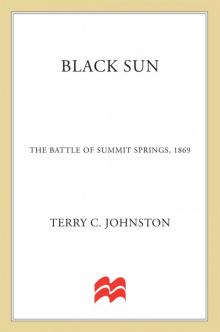 Black Sun, The Battle of Summit Springs, 1869
Black Sun, The Battle of Summit Springs, 1869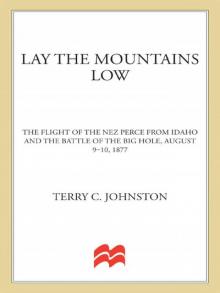 Lay the Mountains Low
Lay the Mountains Low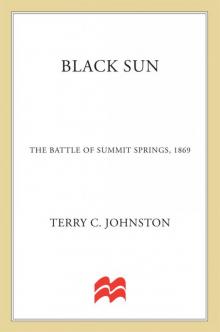 Black Sun: The Battle of Summit Springs, 1869 (The Plainsmen Series)
Black Sun: The Battle of Summit Springs, 1869 (The Plainsmen Series)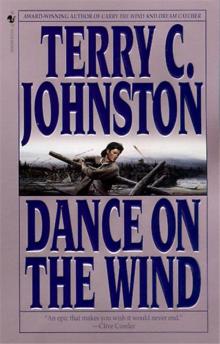 Dance on the Wind tb-1
Dance on the Wind tb-1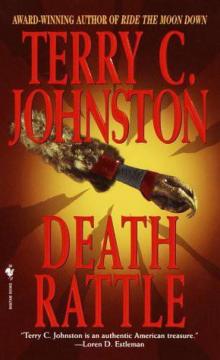 Death Rattle tb-8
Death Rattle tb-8 The Stalkers
The Stalkers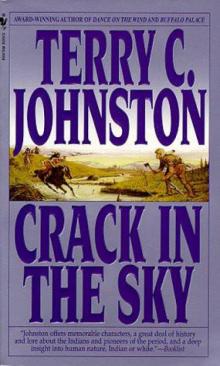 Crack in the Sky tb-3
Crack in the Sky tb-3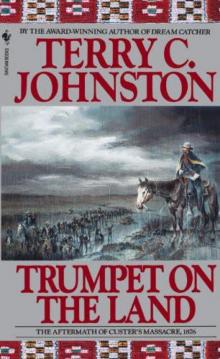 Trumpet on the Land: The Aftermath of Custer's Massacre, 1876 tp-10
Trumpet on the Land: The Aftermath of Custer's Massacre, 1876 tp-10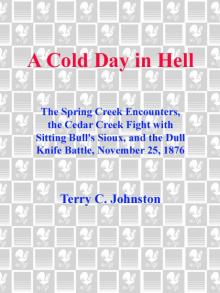 A Cold Day in Hell
A Cold Day in Hell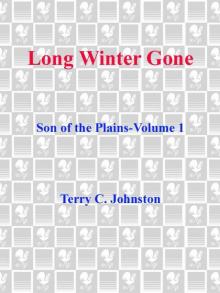 Long Winter Gone: Son of the Plains - Volume 1
Long Winter Gone: Son of the Plains - Volume 1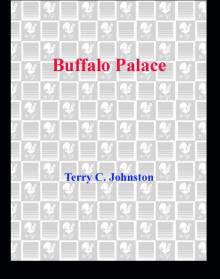 Buffalo Palace
Buffalo Palace Cries from the Earth
Cries from the Earth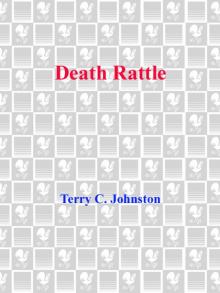 Death Rattle
Death Rattle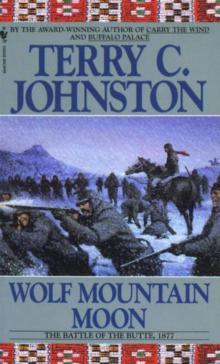 Wolf Mountain Moon: The Battle of the Butte, 1877 tp-12
Wolf Mountain Moon: The Battle of the Butte, 1877 tp-12 Crack in the Sky
Crack in the Sky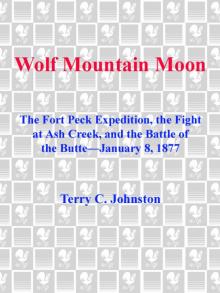 Wolf Mountain Moon
Wolf Mountain Moon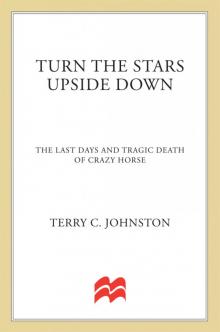 Turn the Stars Upside Down: The Last Days and Tragic Death of Crazy Horse
Turn the Stars Upside Down: The Last Days and Tragic Death of Crazy Horse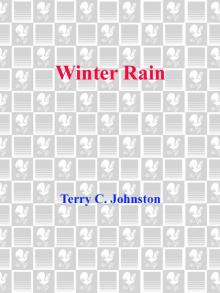 Winter Rain
Winter Rain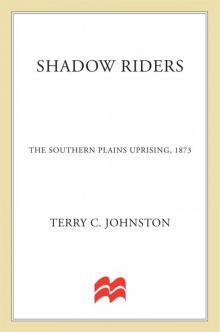 Shadow Riders: The Southern Plains Uprising, 1873 (The Plainsmen Series)
Shadow Riders: The Southern Plains Uprising, 1873 (The Plainsmen Series)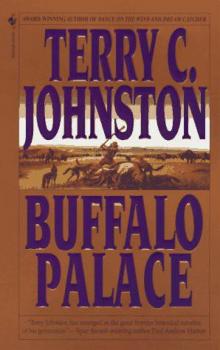 Buffalo Palace tb-2
Buffalo Palace tb-2 Cries from the Earth: The Outbreak Of the Nez Perce War and the Battle of White Bird Canyon June 17, 1877 (The Plainsmen Series)
Cries from the Earth: The Outbreak Of the Nez Perce War and the Battle of White Bird Canyon June 17, 1877 (The Plainsmen Series)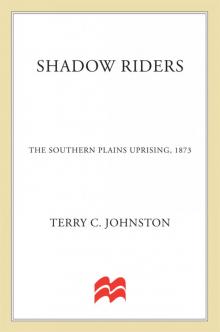 Shadow Riders, The Southern Plains Uprising, 1873
Shadow Riders, The Southern Plains Uprising, 1873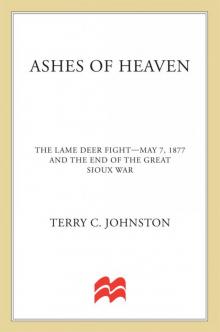 Ashes of Heaven (The Plainsmen Series)
Ashes of Heaven (The Plainsmen Series)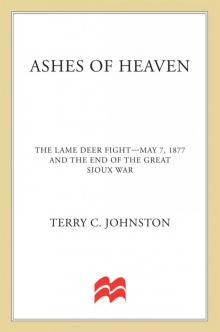 Ashes of Heaven
Ashes of Heaven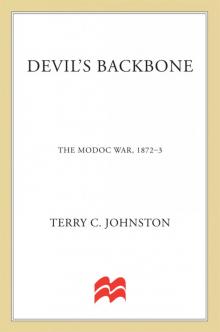 Devil's Backbone: The Modoc War, 1872-3
Devil's Backbone: The Modoc War, 1872-3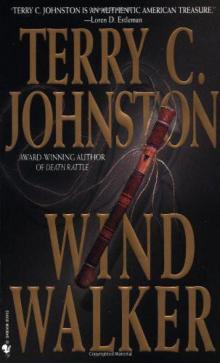 Wind Walker tb-9
Wind Walker tb-9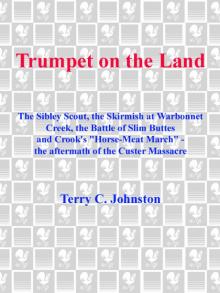 Trumpet on the Land
Trumpet on the Land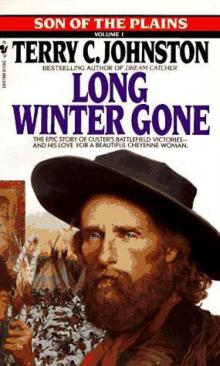 Long Winter Gone sotp-1
Long Winter Gone sotp-1 Dying Thunder
Dying Thunder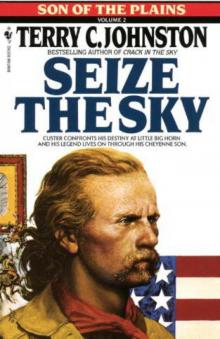 Seize the Sky sotp-2
Seize the Sky sotp-2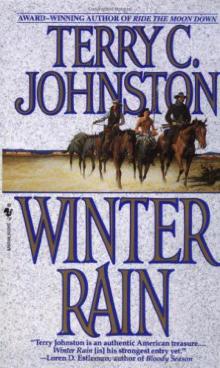 Winter Rain jh-2
Winter Rain jh-2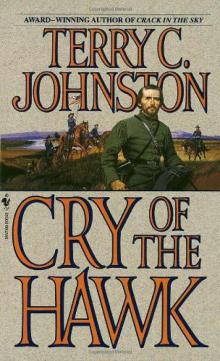 Cry of the Hawk jh-1
Cry of the Hawk jh-1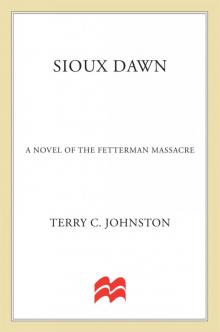 Sioux Dawn, The Fetterman Massacre, 1866
Sioux Dawn, The Fetterman Massacre, 1866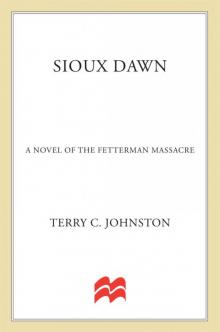 Sioux Dawn: The Fetterman Massacre, 1866 (The Plainsmen Series)
Sioux Dawn: The Fetterman Massacre, 1866 (The Plainsmen Series)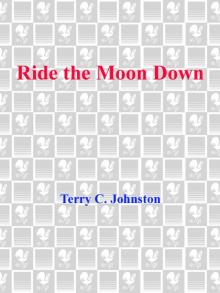 Ride the Moon Down
Ride the Moon Down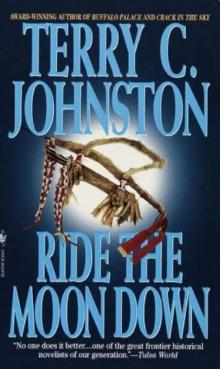 Ride the Moon Down tb-7
Ride the Moon Down tb-7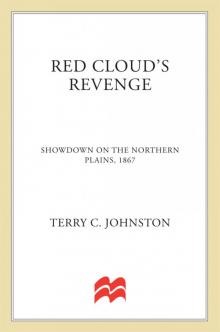 Red Cloud's Revenge
Red Cloud's Revenge Wind Walker
Wind Walker